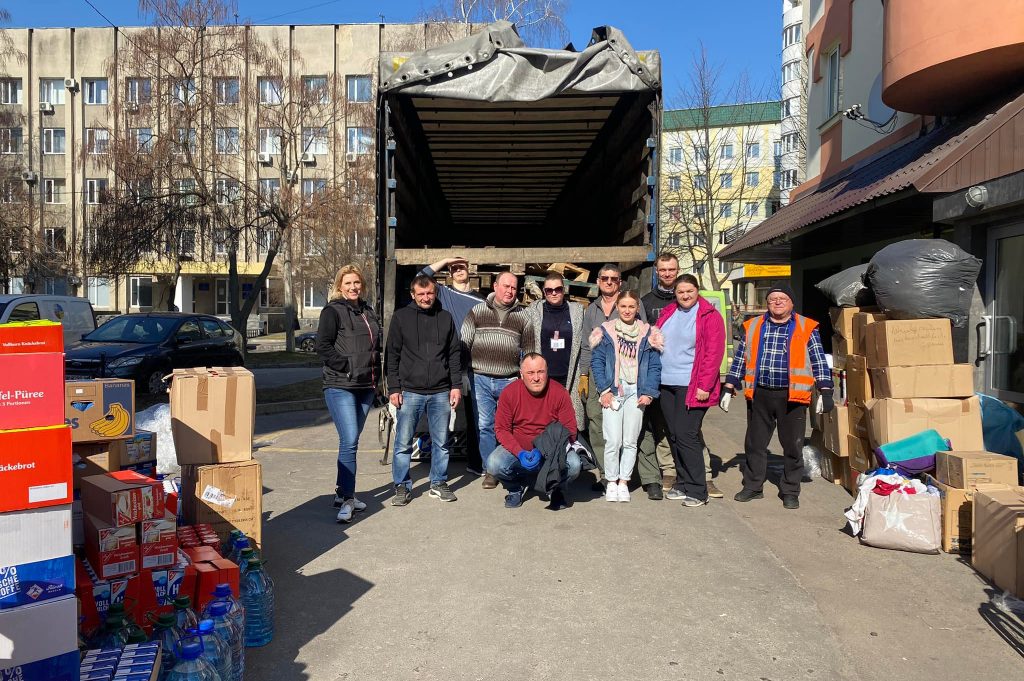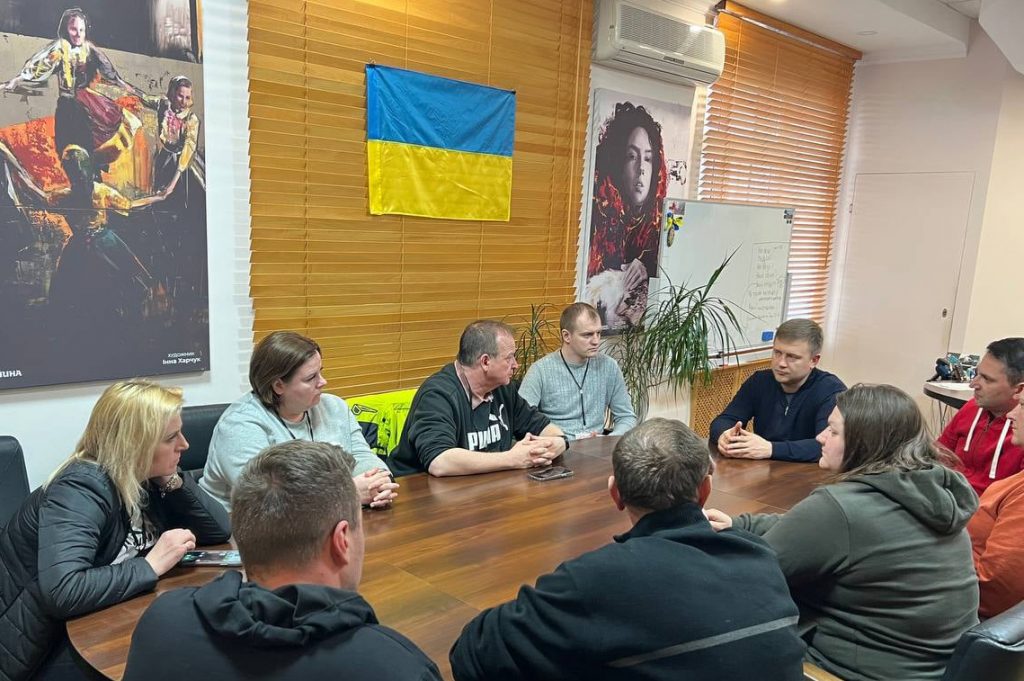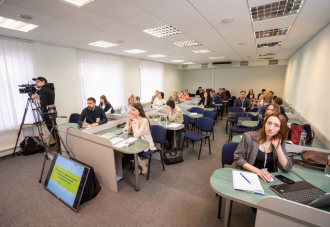Can we say that the chairpersons of housing cooperatives are also superheroes in wartime? Flows of sensitive information passing through chats and groups of HOAs, organizing shelters, supporting the livelihood of houses, helping displaced people and volunteer support for the regions where active hostilities are taking place – this is today’s everyday life of housing cooperatives in the Rivne Region.
We talked to Olena Khomych, a member of the board of NGO Resource Center for the Support of Housing Cooperatives in Rivne Region about what exactly they have been doing for more than two months of the Russian invasion, as well as what should be paid special attention to during the war.
Housing cooperatives in the country is a powerful movement that can really help
On February 22, the Energy Efficiency Center was opened in Rivne Region with the support of the Rivne Regional State Administration, the Regional Council, the Resource Center for the Support of Housing Cooperatives in Rivne Region and patrons. In a few days, training was to take place for the representatives of HOs from the entire region. But they had to respond promptly to the war.
Through messengers and social media, the chairpersons of HOs began to quickly convey important and verified information to the residents, as the residents began to panic.
“Further on, all services communicated with us. The State Emergency Service discussed the issue of who has shelters and who does not. For those who do not shelters, the chairpersons recorded and organized shelters, both with the residents of buildings and with the employees of the State Emergency Service. Other services were also involved, for example, to have Internet in the basements,” says Olena Khomych.
On February 26 volunteer headquarters began their work at the Energy Efficiency Center. The information was distributed through the groups.
At that point nobody knew to what extent Europe would respond, whether we would be able to count on any help. Therefore, in the Rivne Region, each HO chairperson started to collect aid in his own building: canned goods, food, clothes, blankets, and other things people needed. “It was like a coordination center for the HO chairpersons instead of the Energy Efficiency Center,” recalls Olena Khomych.
Subsequently, European friends and colleagues with whom the organization previously worked on the topic of energy efficiency began to contact the Resource Center.
Another thing that the Rivne Region HOs were actively engaged in was safety control in the houses.
According to Olena Khomych, residents began to organize local resistance groups: “For example, my colleagues in the Boiarka residential area organized a group of guys, 50 people, who would constantly patrol the territory around the house before the curfew to avoid large groups of people doing the same thing. For it was already starting to get out of control: one person was checking the roof, another one was calling the police, because someone was loitering there. That’s why we agreed to create a team. And when they would go on their rounds, they would write in the group chat that they were doing an inspection now. They had their own schedule.”
Housing community is a powerful tool ensuring victory
In the face of war, everything, acquired contacts, connections, and knowledge are converted into quick solutions and effective help.
“Say, people are moving into dormitories. And, for example, the hot water supply was turned off. We write: “We need pots and pans to heat water.” The HO chairs post this message in their chats — and this is kind of a chain. This is a huge communication. Because in the group we have, for example, 500 HO chairs, but they can still send information to places where there are 200-500 residents in the chats. And any issue is resolved quite quickly.”
The Resource Center for the Support of Housing Cooperatives in Rivne Region has been engaged in the development of associations for several years. Thanks to the efforts of activists, in 2021, a regional council was established on the issues of creating and ensuring the functioning of the associations of co-owners of apartment buildings.
Olena Khomych and Alona Lapiuk, the head of the organization, studied and networked. These are both the Mentorship Program and Community Advisors. “We were constantly bringing in our knowledge here, on the ground, gathering people and sharing information with them,” says Olena Khomych.
The team partnered with the leadership of the Rivne Region to implement ideas that could improve houses and the lives of residents.
All of this served as the basis of trust, which, with the beginning of the full-scale war, contributed to concrete results.
For example, it took 1 hour and 8 minutes for the representatives of two organizations to arrange the delivery of humanitarian aid. Thus, the most necessary hygiene products and food went from Rivne to the NGO BCD from the village of Nemishaieve, Kyiv Region.
“We constantly send the necessary things to Dnipro, Sumy, Shostka through our contacts… It’s not just Rivne, but the whole region has joined in. Everyone called asking what to do, where to take it, what is needed. And it’s just that the residents already knew where our headquarters is,” says Olena Khomych.
Every day the headquarters posted a list of requests on a flipchart: “People would come in – see it, take pictures, bring it in. We would write who it should be delivered to.”
Housing cooperatives never stop
“It’s just like the President of our country, only we’re a little smaller in our house,” Ms. Olena talks about the work of HO chairs.
According to her, there are also HO chairs who are currently serving in the Armed Forces of Ukraine: “A house cannot exist by itself. We are helping on the ground so that things keep going on there. The military guys are defending us, and we are having their back here.”
Despite the fact that since the beginning of the war, everyone has started to devote more time to the volunteer headquarters, HOs are working.
“Elevators, cleaners, plumbers, electricians are working. We have appointments with people, issue certificates, we have not stopped,” says Ms. Olena. “The only thing that has changed is that the HO chairs began to simply write “Air Raid Alert” in the chat. Even during the air raid alert, the HO chairs, like moms and dads, are responsible for the house and are still in control.”
Another challenge for HOs today is the flow of people renting apartments. At the same time, you have to keep track of everything: who’s renting the space, who’s living there. Also, it is necessary to refer people to the Administrative Services Centers (ASC), the Department of Social Protection, and if necessary, provide legal services.
In Olena Khomych’s opinion, in addition to ensuring the basic needs of the buildings, one should also remember about energy efficiency.
One of the HOs in Rivne, managed by Volodymyr Lazarchuk, has already completed a project with the Energy Efficiency Fund in wartime conditions. The house was insulated, the facility was handed over. Thanks to this, the residents of the house are already saving gas.
“I am very proud of our Volodymyr Lazarchuk, who nevertheless convinced his residents and completed the upgrade project. He only had to finish insulating and painting the house, he did not sit back waiting, he was not afraid,” says Ms. Olena. “In the same way, now Ihor Khanenko is also finishing his project and will verify it.”
The question of whether the houses should be insulated or repaired does not even arise for the Rivne Region.
According to Olena Khomych, the leadership of the region supports both business operations and development, because this becomes a “slap in the face of Russia”: “When you show people, especially those from the East, that we keep on living, that we have houses being insulated… You can’t even imagine the reaction of these people, children, women who come to us and see how nice those old prefabricated apartment buildings look.”
How can this be done under martial law and the threat of a missile attack? “If there is air raid alert, they stop working, go to shelter, after the air raid alert they go on working,” explains Mrs. Olena.
And this matters. After all, such a strategy is a struggle for Ukraine’s energy independence.
The material was prepared by Kseniia Ditchuk





